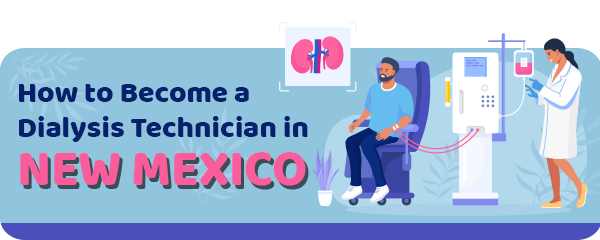Without dialysis machines and skilled operators, many lives would be significantly shortened, emphasizing the critical role of dialysis technicians in the healthcare sector.
Operating a dialysis machine may not seem glamorous, but it presents a fulfilling career for those driven by a desire to assist others.
If you’re interested in learning more about this profession, you’re in the right place, so keep reading!
Article Table of Contents
Dialysis Technician Job Description in New Mexico
Before choosing a profession, it’s essential to understand your future responsibilities.
In New Mexico, dialysis technicians primarily work with patients dealing with kidney problems.
Their core responsibility involves ensuring the dialysis machine functions correctly and adapting it to individual patient needs.
Their duties encompass:
- Monitoring the vital signs of patients
- Assisting patients throughout the dialysis procedure
- Ensuring the safety and comfort of patients
- Reviewing patients’ medical history to identify potential concerns during the procedure
- Adjusting dialysis machines to suit individual patient needs
- Administering oxygen when necessary
- Basic Cardiopulmonary Resuscitation (CPR) if required
While these tasks form the core of a dialysis technician’s role, day-to-day responsibilities may vary.
Dialysis Technician Requirements in New Mexico
The state doesn’t impose strict training or certification requirements for dialysis technicians.
But, they must adhere to guidelines established by the Centers for Medicare and Medicaid Services (CMS).
According to the CMS, prospective dialysis technicians should have:
- A high school diploma or GED.
- Completed a formal training program.
- Attained certification by demonstrating competency in standards of practice
- Gaining a few months of experience
- Achieved licensure or certification.
Certification must be obtained within 18 months of commencing employment.
Certification at the national level is available through examinations such as:
- The Nephrology Nursing Certification Commission (NNCC)
- Certified Clinical Hemodialysis Technician (CCHT) Exam
- The Board of Nephrology Examiners Nursing and Technology (BONENT)
- Certified Hemodialysis Technician (CHT) Exam
- The National Nephrology Certification Organization, Inc. (NNCO)
- Certified in Clinical Nephrology Technology (CCNT) Exam
- Certified in Biomedical Nephrology Technology (CBNT) Exam
Before getting your license, you need to take a written and practical exam.
Certified technicians are expected to complete continuing education courses every two years and pass a recertification exam every four years.
Dialysis Technician Training Schools in New Mexico
To embark on this career path, prospective dialysis technicians in New Mexico should begin by graduating from high school or obtaining a GED.
During high school, focusing on subjects such as biology, chemistry, medical terminology, anatomy, and physiology is advantageous.
However, the comprehensive training required for this profession takes place in post-secondary educational institutions, like:
- Vocational schools,
- Community colleges,
- Technical institutes.
Some of the subjects you’ll study during the specialized training are:
- Principles of dialysis
- Care of patients with kidney failure
- Possible complications of dialysis
- Water treatment and dialysate preparation
- Infection control
- Safety Dialyzer reprocessing
Usually, it takes a year to complete an appropriate training program.
These next colleges and universities are approved to offer training to residents of New Mexico.
Calhoun Community College 
Calhoun Community College offers a comprehensive 50-hour training program with two flexible completion options: online and in a classroom setting.
The online program, priced at $1,299, includes e-books and must be completed within 6 months.
In contrast, the classroom option costs $999, which also covers the cost of textbooks.
Classes for the in-person option are scheduled for Mondays and Wednesdays, starting at 6 p.m.
You’ll have to relocate for this course if you study better in a classroom.
Please note that refunds are applicable exclusively to in-person classes.
Alabama State University 
Alabama State University offers an online training program designed for those aspiring to take the Certified Hemodialysis Technicians (CHT) exam.
This program is accessible to students from various states, provided they confirm its alignment with their respective state regulations.
The program’s total tuition is $4,190, which can be conveniently paid in installments.
It spans 205 hours of study and must be completed within a year.
CPR training and certification are included in the course and are offered by the Red Cross.
Some core course topics include:
- The Cardiovascular System
- The Urinary System
- The Endocrine System
- The Reproductive System
- Infection Control
- Principles of Hemodialysis
Auburn University 
Auburn University presents a fully online dialysis technician program with a tuition fee of $3,000.
This comprehensive package includes many perks.
Some of these are:
- Interactive learning modules,
- Various learning exercises,
- Access to career resources,
- Round-the-clock mentoring support,
- Opportunities for national and state certifications,
- Self-paced learning.
Students are expected to complete their coursework within a maximum period of 6 months.
| School Name | Address |
|---|---|
| Auburn University | online |
| Alabama State University | online |
| Calhoun Community College | online |
Dialysis Technician Salary in New Mexico
Before pursuing any career, it’s important to consider potential earnings.
Dialysis technicians in New Mexico typically start at an entry-level position, with a median salary of $40,600 annually.
If you’re interested in discovering which cities in New Mexico offer higher salaries, this information can be found in the provided table.
Annual Salary Range:| Location | Avg. Annual Salary |
|---|---|
| Santa Fe | $41,600 |
| Albuquerque | $41,400 |
| Pecos | $41,200 |
| Santa Cruz | $41,100 |
| Espanola | $41,100 |
| Abiquiu | $40,900 |
| Youngsville | $40,900 |
| Tome | $40,800 |
| Socorro | $40,700 |
| Alamogordo | $39,200 |
Regional Salary in New Mexico
| Region | Employed | Avg. Annual Salary | Avg. Hourly Pay | Top 10% Annual Salary | Bottom 10% Annual Salary |
|---|---|---|---|---|---|
| Albuquerque, NM | 1,050 | $52,300 | $25.15 | $76,720 | $35,410 |
| Farmington, NM | 110 | $53,630 | $25.78 | $92,510 | $29,490 |
| Las Cruces, NM | 150 | $46,530 | $22.37 | $71,160 | $27,670 |
| Santa Fe, NM | 200 | $58,840 | $28.29 | $82,560 | $36,840 |
* Employment conditions in your area may vary.
Frequently Asked Questions
Do I need a license or a certification to work as a dialysis technician in New Mexico?
In New Mexico, individuals only need a certification recognized at the national level if they want to work as dialysis technicians.
Where Does a Dialysis Technician in New Mexico Find Work?
There are many different settings where a dialysis technician can find employment.
The following locations are the most common:
- Hospitals
- Dialysis centers
- Outpatient clinics
- Home healthcare agencies
Which Other Skills Are Required for a Dialysis Technician in New Mexico?
Dialysis techs must possess a series of skills and abilities.
These include:
- Attention to details
- Excellent communication
- Empathy
- Patience
- Compassion
- Technical mind
Read the full guide: How to Become a Dialysis Technician



